Chapter Thirty-three – Palmas y Naranjos
Palmas y Naranjos
HAVING travelled through the La Mancha region in a night as dark as a gipsy, I cannot say whether it really contains giants or whether they are merely wind-mills; but on the other hand I can enumerate to you quite a lot of things which are to be found in the provinces of Murcia and Valencia, to wit and particularly : yellow or red rocks, white crags of limestone and blue hills as a background; on each rock, crag and hill the ruins of a Moorish fortress or a Christian stronghold or at least a hermitage, a chapel or a belfry; the huge brown remains of Montesa, the citadel of Játiva bristling with towers and battlements, all kinds of fortifications, fortresses and watch-towers; the stronghold of Puig and the ramparts of Nules, the ruins of Sagunto, a whole acropolis on a rocky summit, and the four-square castle of Benicarló; brown and red wastes of rocky hill-sides, overgrown with tufts of esparto, with hazel-bushes, sprays of thyme, rosemary, tenkria and sage; arid slopes parched like pottery just removed from the oven and still hot; and right below them olive gardens, grey and silvery, similar to our willows, with their gnarled and twisted trunks which resemble mandragoras, goblins or something else remotely human; and among the olives a parched and stony puebla with a small church like a stronghold, with squat houses and some sort of ruins above.
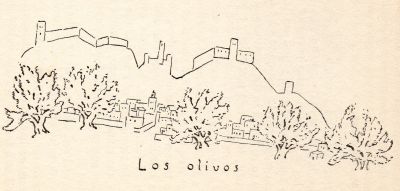
Then, groves of fig-trees, large-leaved and unkempt; dense and luxuriant algarrobos, which produce pods of the carob-bean, otherwise known as St.John’s bread; and date-palms, rows upon rows of palms thrusting their triumphant tops aloft; palm groves, townships steeped in palms, glistening faience cupolas and minarets amid palms and banana-trees, and above this another stronghold of some sort of other.
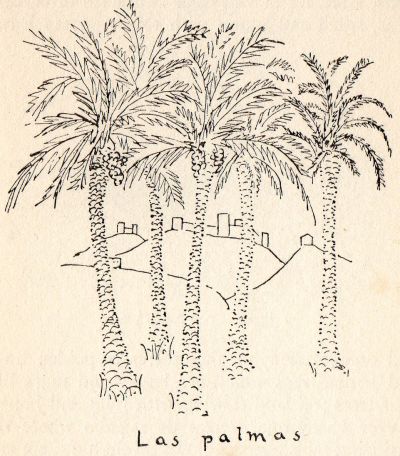
Irrigated huertas, rice-fields, mulberry plantations, stretches of vineyards and acres of orange-trees, small and round with tough, glossy leaves and oranges arraying themselves in golden tints, and lemon-trees which are larger and more like pear-trees; a land flowing with milk and honey, if ever I saw one, tierras de regadio where the fertilizing moisture still flows through gutters and runnels which were laid down by Roman farmers and Moorish architects; and above this golden land, on the blue hills, bastions, turrets and notched walls of Moorish strongholds.
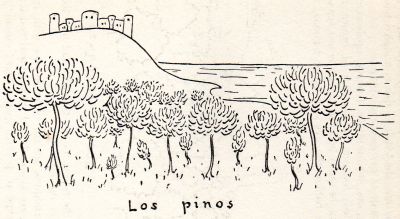
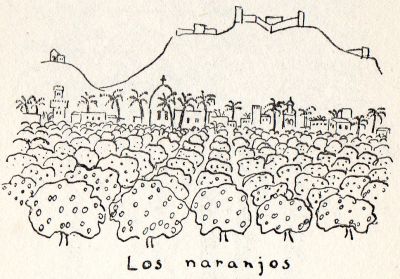
Valencia, with its blue and gold azulejo cupolas, its brown-faced people and golden air, in which sea-air and the smell of fish is mingled with the fragrance of oranges and syrup; sea, sea, sea luminous, flaming, opalescent and crinkled, foaming at the foot of brown rocks, licking the sandy beaches, and azure sea, sea whose range baffles the eye; malarial lagoons, inlets amid the rocks, the wing-shaped sail of a fishing boat on the horizon.
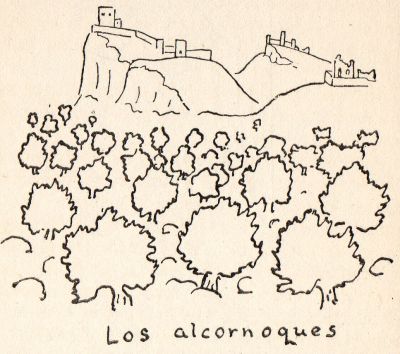
Alcornoques, groves of cork-oaks with leaves which are almost black, leathery and coiled into the shape of pointed paper-bags; small pine-groves on the salt sandy flats; on the mountains strongholds and hermitages; so the sea on the right, and on the left, mountains – where must I look to leave nothing out ? –oh, to float on the sea or be a hermit in yonder mountains, to sail out on a fishing cruise, to tread grapes or press out oil, ha, you scarlet rocks, nowhere are rocks so crimson.
Behold, Oropesa, a township clinging to a rock, doubtless it looked exactly the same a thousand years ago, although I cannot tell which nation dwelt there then; - and yet you could not say at what point a country undergoes such a change, or in what that change consists; suddenly it reminds you of something else.
It is no longer Africa, but something familiar to you; it might be the Corniche at Marseilles or the Riviera de Levante; once more it is a Latin country, the warm and sparkling Mediterranean basin, and when you look at the map, you discover that it is called Cataluña.
